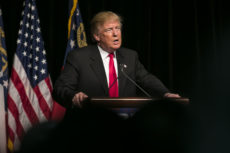Trump’s Talk: Aspirations, Not Policies
 Donald Trump’s acceptance speech at the Republican National Convention was a list of aspirations, without any explanation of the policies he had in mind to meet those goals. That’s not surprising, because that is the nature of political campaign rhetoric. Politicians rarely say what they plan to do. Rather, they talk about perceived problems that exist now, and say they will make things better. This isn’t a criticism of Trump. All politicians do that, and I fully expect Hillary Clinton’s acceptance speech to be much the same.
Donald Trump’s acceptance speech at the Republican National Convention was a list of aspirations, without any explanation of the policies he had in mind to meet those goals. That’s not surprising, because that is the nature of political campaign rhetoric. Politicians rarely say what they plan to do. Rather, they talk about perceived problems that exist now, and say they will make things better. This isn’t a criticism of Trump. All politicians do that, and I fully expect Hillary Clinton’s acceptance speech to be much the same.
Trump said he would make America safe again. He didn’t say how. He said he’d hire the best people to get the job done, but he didn’t say who they are, or how he would find them.
Trump said we had bad trade deals, and he’d renegotiate them to get better deals. He didn’t say what was wrong with the deals we have, and he didn’t say what terms he’d include in any renegotiated deals.
Trump said he’d cut taxes. He didn’t say what taxes he would cut, or give any outline of tax reductions he had in mind.
Trump said he’d cut regulations that reduce productivity. He didn’t say what those regulations were, or what regulations would be eliminated.
Trump said he’d return manufacturing jobs to the United States. He didn’t say how he would do this, leaving me with the suspicion that he’s inclined to place regulations on businesses–the very kind he said he’d repeal in another part of his talk.
This is the nature of campaign rhetoric. Rather than advocate specific policies, point out how things could be better than they are. Everyone agrees they could be. And then say if you are elected, you will make things better. So, while I don’t fault Trump for following a long-standing formula in his campaign speech, I can’t give him too much credit for bold thinking either.
My overall evaluation of his talk was negative. Why? Because well before it was over, I was asking myself how much longer he was going to talk. When that happens, I figure the speaker has gone on too long.





